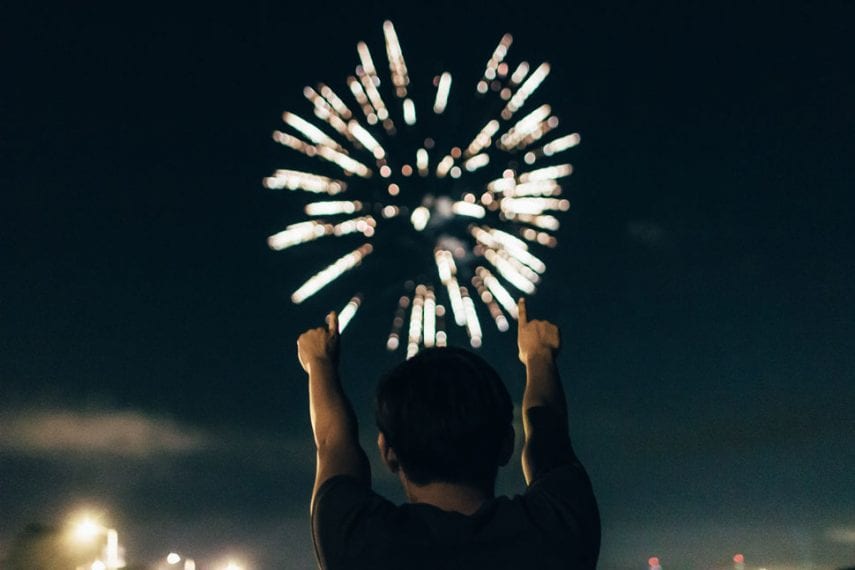What to Do When Your Anxiety Gets the Best of Your New Year’s Plans

From New Year’s Eve to New Year’s Resolutions, this time of year can be difficult for those struggling with an anxiety disorder. However, planning ahead for a positive celebration can help ease that stress, as can setting positive resolutions that are hassle-free and achievable. Thinking positive thoughts about the past year and staying mindful of the present moment can also be helpful in bringing gratitude and joy to your New Year’s celebration.
Jessica snuggled tighter under her fuzzy holiday blanket and decided she’d get ready for her friend’s New Year’s party in another ten minutes. She’d decided the same thing ten minutes before. Not only did she not want to go—the entire affair made her anxious beyond belief. Having to get “all dolled up,” answer everyone’s questions about the resolutions she had or hadn’t made, who she was dating (or wasn’t), and how the past year had gone—all of it made her feel sick to her stomach.
If you’re anything like Jessica, partying until the ball drops on New Year’s Eve may not be your idea of a good time. The new year can come with a lot of new unknowns, and people who already struggle with anxiety may find this time of year to be even more troublesome than most. If your anxiety disorder is giving you trouble this New Year’s Eve (whether it’s because of an upcoming New Year’s Eve bash or the resolutions you haven’t yet met), there are ways that you can make this holiday more peaceful and enjoyable. Focusing on your needs, honoring your limits, and getting into a deliberately positive frame of mind can help make New Year’s Eve a celebration once more.
Plan Ahead to Enjoy New Year’s Eve
If you struggle with an anxiety disorder, you may already know that alcohol can exacerbate your anxious thoughts. Combine that chemical reaction with a sleepless night and a bad hangover, and you have a recipe for an anxiety-filled disaster of a New Year’s morning. Do your body a favor and try to limit the amount of alcohol you consume at your celebrations. You can still toast champagne or enjoy a drink with friends, but do your best to not overdo it. Your racing thoughts will thank you.
To avoid last-minute planning anxiety, try spearheading your New Year’s Eve plans. If house parties aren’t your cup of tea, or you don’t feel like paying a twenty-dollar cover to get into a bar or a club, why not do a little research and find an event that you would genuinely enjoy? You never know who else might be relieved and excited to take part with you in a midnight yoga class, a New Year’s sock hop, or a live tuba show. Making your own plans significantly lowers the performance stress of the holiday and the need to “chase a good time” if you don’t have plans already.
Maybe your body and mind are actually requesting a night in. There’s no shame at all in staying home with a cozy blanket, a fire, and a good book—as long as that’s what you want to do. Ringing in the new year peacefully with a relaxed state of mind might be just the change you’ve been looking for.
Set Positive Resolutions That You Can Actually Keep
Looming New Year’s resolutions can also be a source of anxiety this time of year. Whether you’re finding yourself feeling guilty for not completing last year’s goals or worrying that you won’t live up to this year’s, resolutions can be tricky for individuals who are prone to anxiety. Obviously, the easiest way to alleviate anxiety around New Year’s resolutions is not to make any at all. If the idea of passing on resolutions this year floods you with a sense of relief, give yourself permission to do so.
If you do decide to make them, cut some of the stress out by framing them in positive language. Instead of saying you’ll “stop being so anxious” in 2017, decide to “match every worry with two peaceful thoughts,” or “use deep breathing exercises” when you feel your anxiety rising. Rather than deciding to “stop judging” yourself for having anxiety, strive to increase your self-acceptance. It’s incredibly hard to “stop” doing anything. However, it’s much easier to start doing something new, especially if your goal is specific. Setting a goal that you can perform daily at a specific time (first thing in the morning, right before bed) such as taking five deep breaths, deliberately smiling, meditating, or repeating a mantra can help you achieve the same result.
New Year’s resolutions often include physical health goals. New diets, exercise plans, and weight loss numbers feature prominently this time of year—and while these things are often helpful, they can be overwhelming for people who already struggle with their mental health. Try including “improved mental health” in your resolutions this year instead, and be specific about how you’ll accomplish this. Seeking professional help from a therapist, reaching out to your loved ones about your experience, and pursuing self-care can all be productive means toward this end.
Be Kind to Yourself About the Year That’s Passed
As the year draws quickly to a close, it can be tempting to focus on the things you’ve struggled with most. However, we can all challenge ourselves to remember and honor the positive moments of the year as it comes to an end. Take a moment to make a mental checklist of your biggest highlights from this past year. You may need to go back through planners or journals to remember them all, but you’d be surprised at all the wonderful things that occurred that you may have forgotten.
This may also be a good time to do some reflective journaling about this past year. Consider exploring what positive lessons you learned this year, what new relationships you’re thankful for, what tasks you accomplished, and what surprised you. To move into the new year with positivity, find a way to celebrate yourself. Write yourself an email or a letter honoring yourself for something you accomplished this year—or just congratulate yourself for completing 2016 altogether. Acknowledging your successes in this way can do wonders for your peace of mind at the close of the year.
Pursue Mindfulness in the Present Moment
It can also help to stay mindful during each moment in an effort to keep your mind in the present. Enjoy each bite of holiday dishes, slowly savor New Year’s treats, and be actively appreciative of time with family and friends. Mindfulness and gratitude can be great balms for anxiety year-round, but especially as we enter a new year.
From all of us at Bridges to Recovery, we wish you a joyful new year and a positive outlook in 2017. Anxiety disorders can be difficult to deal with, especially during the holidays, but know that there are always supports that you can put in place for yourself. If you’re interested in learning more about mental health recovery services or how Bridges to Recovery can help you with your anxiety disorder, feel free to contact us directly.
Lead Image Source: Unsplash User Ryan Wong






